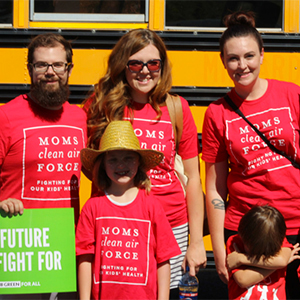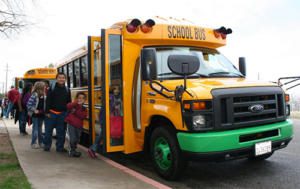ELECTRIC SCHOOL BUSES
The Smartest Way to Get to School
 Elders Climate Action is joining with our partners at Moms Clean Air Force to encourage Members of Congress to support the Clean School Bus Act. Millions of children still ride diesel-powered school buses, exposing them to harmful diesel pollution that can trigger asthma attacks and interfere with their ability to learn.
Elders Climate Action is joining with our partners at Moms Clean Air Force to encourage Members of Congress to support the Clean School Bus Act. Millions of children still ride diesel-powered school buses, exposing them to harmful diesel pollution that can trigger asthma attacks and interfere with their ability to learn.
Diesel exhaust is a known human carcinogen. The tiny particles of pollution in diesel exhaust can lodge deep in the lungs and cause irritation. In addition to short-term problems like coughing, headaches, and nausea, breathing these fumes has been shown to damage both the lungs and the heart.
Even worse, diesel pollution inside the bus can be several times higher than outside the bus. That means that children may be getting an extra-large dose of diesel pollution during their school commute.
Congress has taken an important step toward solving the diesel school bus problem by introducing legislation that would fund school districts to purchase electric buses with zero tailpipe emissions.



Why We Need Clean School Buses

Diesel buses create tailpipe pollution, which causes a wide range of health issues. Tailpipe pollution from buses is shown to trigger asthma attacks, interfere with lung development, contribute to cancer — and even reduce children’s ability to learn.
Children are more vulnerable to diesel pollution than adults. Young lungs and hearts work harder than those of adults. Children take more breaths, and their hearts beat faster. Their organ systems are still growing — especially their lungs, which aren’t fully mature until around age 20.
The air inside a school bus can be more polluted than the air outside of it. Diesel pollution can seep inside the bus cabin from the tailpipe, and then get trapped inside. This is bad for the children, and bad for the bus drivers, too. Diesel buses also add dangerous climate pollution to our air.

Electric school buses help clean up the air we all breathe. They run on battery power, with no tailpipe emissions. That means no harmful diesel pollution, and no dangerous climate pollution. We benefit too!
Electric buses can help cut harmful diesel emissions in communities burdened with high levels of traffic pollution and high rates of childhood asthma. They’re also great in rural communities where children often have to take long bus rides.
Electric school buses cost more than diesel buses, but that will change as more are sold, and there are government and utility plans to help fund new buses.
Electric buses cost 60% less to operate and maintain. There are fewer moving parts in electric buses so fewer repairs are needed.
They charge while schoolchildren sleep and are ready for the next day’s runs.
If electric buses rely on electricity from coal, oil, and gas, do they really help reduce pollution?
Yes. The air is cleaner and our grandchildren and all children are safer, because there are no direct tailpipe emissions from an electric bus. But to really clean up our air and safeguard our climate, the entire electricity grid needs to get cleaner and more resilient as well.
Is it as simple as buying a new bus and plugging it in?
Fleets of electric buses will require charging stations, and grids will have to be ready to handle the new demand.
The good news is that transitioning the school bus fleet to all-electric can help expand and stabilize our electricity system, providing surplus energy storage through the engine batteries.
“Vehicle to Grid” technology allows electric buses to sell stored electricity back into the grid at times of high demand. Electric buses can even serve as mobile power stations during power outages or emergencies.
Electric buses are ready to go. They’re up and running all over the country, in all types of weather and terrain. Several companies already manufacture them in the
United States.
How can we make electric school buses happen in our communities?
We support a complete nationwide transition to electric school buses as a way to reduce the harmful pollution our grandkids breathe and to help solve the climate crisis.
 | Lawmakers should fund grant programs and research initiatives to help schools transition to cleaner buses and improve the technology. These programs should prioritize those communities already struggling with high levels of air pollution and childhood asthma. |
 | School districts should commit to purchasing electric buses, starting now. |
 | Utilities should assist school districts in financing buses and electric vehicle infrastructure, while investing in renewable energy. |
 | Parents & Grandparents should speak up and demand cleaner buses to protect our children’s health and future. |
Thank you to Moms Clean Air Force for compiling this information and leading this action.
Sources:
Download this info as a PDF.
https://uspirg.org/sites/pirg/files/reports/US_EL%20buses%202021%20scrn.pdf
https://www.epa.gov/dera/making-school-buses-cleaner#:~:text=Older%2C%20more%20polluting%20school%20buses,they%20have%20faster%20breathing%20rates
https://www.epa.gov/dera/reducing-diesel-emissions-school-buses
https://pennenvironment.org/sites/environment/files/reports/Electric%20Buses%20-%20PA%20-%20May%202018.pdf
https://www.edf.org/sites/default/files/cleanbuses_14_screen.pdf
https://www.nrdc.org/sites/default/files/schoolbus.pdf
http://www.ehhi.org/reports/diesel/diesel.pdf
https://ww2.arb.ca.gov/resources/documents/childrens-school-bus-exposure-and-mitigation-studies
https://www.interactanalysis.com/decarbonising-the-us-yellow-school-bus-fleet-a-policy-worth-pursuing/
